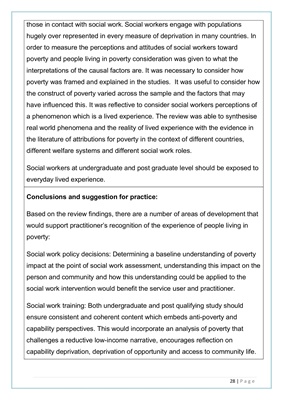
28 | P a g e
those in contact with social work. Social workers engage with populations
hugely over represented in every measure of deprivation in many countries. In
order to measure the perceptions and attitudes of social workers toward
poverty and people living in poverty consideration was given to what the
interpretations of the causal factors are. It was necessary to consider how
poverty was framed and explained in the studies. It was useful to consider how
the construct of poverty varied across the sample and the factors that may
have influenced this. It was reflective to consider social workers perceptions of
a phenomenon which is a lived experience. The review was able to synthesise
real world phenomena and the reality of lived experience with the evidence in
the literature of attributions for poverty in the context of different countries,
different welfare systems and different social work roles.
Social workers at undergraduate and post graduate level should be exposed to
everyday lived experience.
Conclusions and suggestion for practice:
Based on the review findings, there are a number of areas of development that
would support practitioner's recognition of the experience of people living in
poverty:
Social work policy decisions: Determining a baseline understanding of poverty
impact at the point of social work assessment, understanding this impact on the
person and community and how this understanding could be applied to the
social work intervention would benefit the service user and practitioner.
Social work training: Both undergraduate and post qualifying study should
ensure consistent and coherent content which embeds anti-poverty and
capability perspectives. This would incorporate an analysis of poverty that
challenges a reductive low-income narrative, encourages reflection on
capability deprivation, deprivation of opportunity and access to community life.